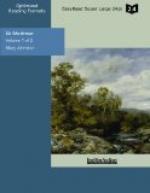High in the air of evening, blown from the town, a trumpet sounded. De Guardiola ground his teeth, for that jubilant silver calling was not for San Jago, but St. George. The notes gathered every memory of the past few days and pressed them upon him in one cup of chagrin. The caravels were gone, the battery at the Bocca gone, the town surrendered to these English dogs who now daily bared their teeth to the fortress itself. De Guardiola admitted the menace, knew from experience in the Low Countries that this breed of the North sprang strongly, held firmly. “Hounds of hell!” he muttered. “Where is the fleet from Cartagena?”
The tropic ocean answered not, and the words of the wind were unintelligible. The sun dropped lower; the plain appeared to move, to roll and welter in the heated air and yellow light. Tall starvelings, the cacti spread their arms; from a mimosa wood arose a cloud of vultures; it was the hour of the Angelus, but no bells rang in the churches of the town. The town sat in fear, shrinking into corners from its cup of trembling. “Ransom!” cried the English from their ships and from their quarters in the square. “Pay us ransom, or we burn and destroy!” “Mother of God!” wailed Nueva Cordoba. “Why ask but fifty thousand ducats? As easy to give you the revenue of all the Indies! Moreover, every peso is housed in the fortress. Day before yesterday we carried there—oh, senors, not our wealth, but our poverty!” Quoth the English: “What has gone up may come down,” and sent messengers, both Spanish and English, to Don Luiz de Guardiola, Governor of Nueva Cordoba, who from his stronghold swore that he found himself willing to hang these pirates, but not to dispense to them the King of Spain his treasure. Ransom! What word was that for the lips of Lutheran dogs!




